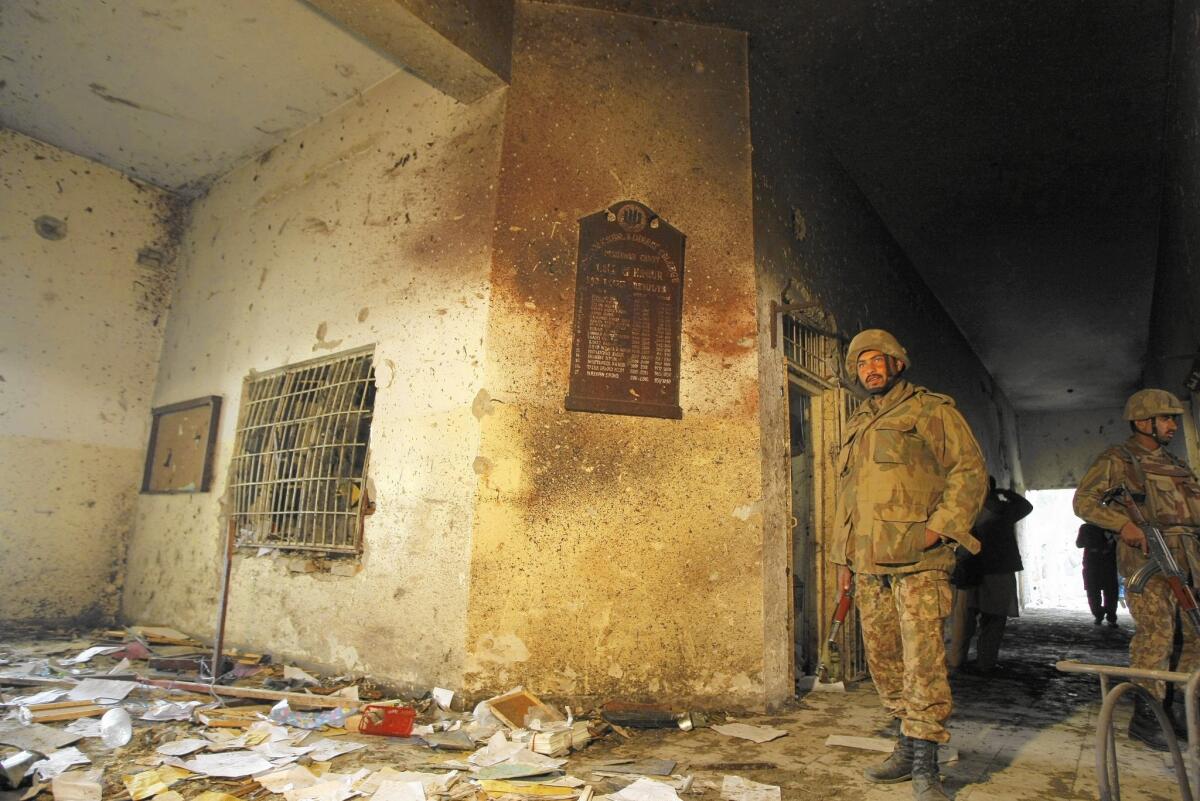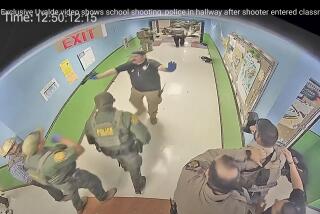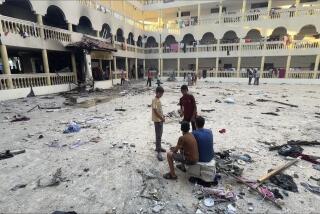Pakistan school massacre hits close to home for reporter in Peshawar

- Share via
Reporting from PESHAWAR, Pakistan — My first thought was: They are reenacting Beslan. Right here in Peshawar, right where I live, in the city where my children go to school.
For any parent who saw footage of the 2004 massacre of children at a besieged school in North Ossetia, Russia, the carnage last week in Peshawar was another nightmare unfolding on the screen.
My children are not students at the Army Public School, where terrorists killed 132 students and 16 staff members Tuesday, but suddenly all I wanted was to be with them, to get them out of their school and home to safety.
But the roads were all closed. They would remain so for the rest of the day. I sat in the car, desperate and useless as both a parent and a journalist, because I couldn’t respond to either my family or my co-workers who kept calling me.
It had started as any other December day in northern Pakistan, cold and dry. I sought warmth in a cup of green tea at the office. I had dropped my son and daughter off at school that morning, about two miles from my office in University Town, and now it was nearly time to pick them up.
Then I saw the news flash: Armed men have entered a school in Peshawar. They are firing at the children.
I was immobilized. Which school? Where? And then: “Loud explosions have been heard from inside the school. Security forces have cordoned off the school building.”
Beslan, where militants took over a school and more than 330 people, half of them children, were killed, flashed before my eyes. We learned it was the Army Public School on Warsak Road, and I knew I would need to get there as soon as possible to cover the story. But while my professional responsibilities pulled me in one direction, my parental instincts pushed me toward another.
“I am going to bring my daughter home,” I told a colleague. “I’ll go to the army school after that.”
Outside the soldiers had closed nearly all the roads. Traffic was snarled everywhere. I somehow managed to reach University Town, taking alternative routes, and found my 5-year-old daughter, Farishta. I quickly buckled her into the car. “Papa, are we going somewhere else?” she asked as I took a narrow, bumpy back road to avoid the clogged thoroughfares.
I didn’t respond. I hoped there would be no traffic and I could drop her off before getting to work. That was when I hit the end of a long line of vehicles. We were stuck.
I have covered conflicts for years for newspapers in Pakistan and overseas. Peshawar, near the troubled border with Afghanistan, is no stranger to violence. Yet looking at the army helicopters hovering overhead, I had the feeling that this was different from the string of militant attacks I had written about for the last decade.
Tension gnawed inside me as we sat in the car, motionless. My daughter cheered on the helicopters swooping low over the airport as if it were an air show enacted for her amusement. I called my office and got the operator. “TV channels are reporting 18 dead,” he said.
Then the Los Angeles Times’ bureau chief in India called. He said wire services had 100 dead. My daughter was playing with the control on the car stereo, switching the radio on and off. It was 3 p.m. and we had been in the car for nearly three hours. She was sullen and wanted to go to the bathroom.
We left the car and walked to a gas station. I thought of trying to park my car there and finding a rickshaw that could evade the barricades, but the security guard refused.
A man nearby got a call and walked away from his car, distraught. It seemed his son had been killed in the attack. I overheard another man say on the phone that his son had been spared. We reached home at 4. My wife hugged Farishta, but said the school bus still hadn’t brought home Faris, our 13-year-old son.
“I don’t need their education. I want them safe,” she said. “Let’s not send them to school anymore.”
Our home is less than a mile from the army school, so she had been hearing explosions and gunfire for hours. I had to leave her in that state, assuring her that Faris would be home soon. The army wasn’t allowing anyone near the school, so I raced back to the office. Unconfirmed reports and rumors poured in. Some said the Pakistani Taliban attackers had taken more than 200 students hostage.
I felt crippled by the tragedy and the knowledge that I couldn’t respond to it. The Times bureau chief emailed, asking whether I could go to the hospital where victims were being treated. A car was out of the question, so I borrowed a colleague’s motorbike.
We waded through the crowd at the Combined Military Hospital, where 104 bodies and more than 100 wounded children had been brought. I saw injured children bleeding to death and forgot I was there to report. I decided to donate blood.
At the blood bank, I saw a mob of young people and women — relatives of the wounded — waiting their turn. I changed my mind and rushed to the emergency room. A trail of bloodstains guided me to the hall where an endless stream of people was bringing in bodies. I turned and saw 18 bodies lying on the floor, among them 16 students, wrapped in bloody white sheets.
The emergency ward looked like a slaughterhouse, and all the beds and gurneys filled up, the bodies had been placed on the floor for identification. Through the thin sheets I could see the bodies of two staff members burned by the attackers.
The students’ faces were uncovered: They were all young adolescents, some only beginning to grow thin facial hair above their lips.
People filed past and no one spoke. All I could hear was the shuffle of feet and the swish of mops as the sanitation staff wiped up the blood in the corridors. The students had all been shot in the head, some right in the temple. Looking at their bloody, bullet-torn faces, I broke down and cried.
Ali has been The Times’ special correspondent in Peshawar since September 2001.
More to Read
Sign up for Essential California
The most important California stories and recommendations in your inbox every morning.
You may occasionally receive promotional content from the Los Angeles Times.













